HIT CHANNEL INTERVIEW: December 2024. We had the great honour to talk with a very talented musician: Gerry McAvoy. He is most well-known as the bass player of Rory Gallagher for 20 years, performing on all of Rory studio albums and tours. When he left Rory’s band in 1991, he joined Nine Below Zero. He later formed Band of Friends performing the music of Rory Gallagher live. In 2015, they released their first studio album titled “Repeat After Me” and in February 2025 they are going to play three concerts in Greece. Read below the very interesting things he told us:
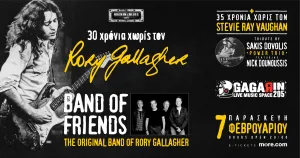 What should fans expect from the three Band of Friends shows in February 2025 in Greece?
What should fans expect from the three Band of Friends shows in February 2025 in Greece?
Hopefully the same as before (laughs). We’ll try our best to please everybody. We are gonna throw a couple of new Rory songs in there that we haven’t done before, just everybody to have a good time. That’s what’s all about and to celebrate the life of Rory.
It seems that you are very happy with the current line up of Band of Friends, aren’t you?
In the beginning of this year I decided to change things a little bit, to use different people. I mean, for the shows in February it will be Jim Kirkpatrick (ed: FM -guitar) and Paul Rose again, with Brendan O’Neill (Rory Gallagher, Nine Below Zero) on drums, obviously, but throughout the year I’ve been using different people. There’s a guy we use called Davy Knowles, he lives in Chicago and we’ve done a couple of American tours with him and Ted McKenna (ed: Rory Gallagher, Sensational Alex Harvey Band -drums), who we lost. Davy came over and did a bunch of shows in Germany, Switzerland and Austria. Just to change the things a while, to play with different people.
What are your thoughts now about Band of Friends’ “Repeat After Me” (2015) album?
It was something we did because we all write songs, that’s what we do. We are doing the Rory thing which is fantastic, but at the same time, I am a songwriter and the rest of the guys in the band at that stage, Ted (ed: McKenna) wrote songs and Marcel (ed: Scherpenzeel -guitar, vocals) wrote songs, so, we decided to do an album with mostly our own songs and we threw a couple a Rory songs in. It’s good for the head.
Was Ted McKenna’s (Rory Gallagher, Sensational Alex Harvey Band, Gary Moore -drums) death in 2019 a big shock for you?
It was terrible shock, yeah. I was very sad because of the circumstances, as well, it was a sort of routine hernia operation. It should have been just routine and it went wrong. It wasn’t a very good day. A terrible loss, a great drummer, a great friend and a lovely man.
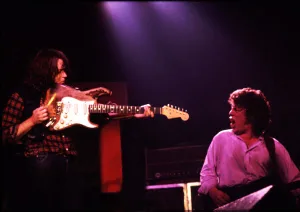 Are you satisfied with the end result of your “Riding Shotgun” (2005) autobiography?
Are you satisfied with the end result of your “Riding Shotgun” (2005) autobiography?
Yeah, I think so. I mean, certain people might criticise it, but it’s basically my life and 20 years of my life was with Rory, I knew him longer than I did playing with him. That took up a big chunk of the book, obviously, because I was 19 until I was 39 when I played with Rory, so, it’s a long time.
Does the “Irish Tour ‘74” live album capture the true spirit of a Rory Gallagher concert?
I think so. There are a couple of live albums: “Live! In Europe” (1972), “Stage Struck” (1980), but I think “Irish Tour ‘74”, especially being recorded in Ireland also, really captured something that was unique at the time and the line up was great: We had Lou Martin on keyboards and Rod de’Ath (drums) and we were really tight at that stage, we’ve been playing non-stop for two years. By the time we got to record in Ireland, the band was really-really hot.
How important was the contribution of Roger Glover (Deep Purple, Rainbow –bass) as producer to “Calling Card” (1976)?
With Roger it was something a little bit different, because Rory was also skeptical about using producers in the studio, he liked to do things by himself. There was a little bit friction between Rory and Roger, but I think the final outcome was good. Roger smoothed a lot of the things like they used to do in Deep Purple, where Rory liked the rougher edges, but the end result was good, no matter what happened in the studio.
Could you please tell us a few words about your amazing bass playing on “Shadow Play” (from “Photo Finish” -1978)?
It was one of those things, I don’t remember we actually rehearsed “Shadow Play”. Rory just came in the studio, we were in Germany in Dieter Dierks Studio and he started playing the riff to me and Ted. So, supposedly, you just join in and obviously because I was a guitar player before I was a bass player, so, I could read what Rory was doing just by his fingering. It was like a jam and then I just did a couple of more polishing. To me, it was a little bit punky, for want of a better word, because it was during the punk era and I think Rory liked some of the things that punk bands were doing, because it was pretty aggressive and pretty hard. I think that’s Rory’s punk song, “Shadow Play”.
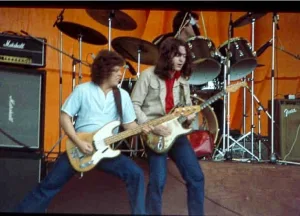 My favourite Rory song is “The King of Zydeco” (from “Fresh Evidence” -1990). How did this song come about?
My favourite Rory song is “The King of Zydeco” (from “Fresh Evidence” -1990). How did this song come about?
Rory was a big fan of an accordion player, Clifton Chenier from New Orleans, Louisiana and that song is basically dedicated to Clifton Chenier. We got a great piano and accordion player, Geraint Watkins (Dave Edmunds, Van Morrison), who played the accordion on that song and that’s the way Rory wrote it. It’s a great song. It really is a great song.
What was Rory like offstage?
Rory was a lovely human being. Besides he’d been a musical compatriot of mine, he was very close friend. He was just a very gentle man, very much.
In your opinion, what was the greatest skill that Rory had?
Oh, that’s difficult, he had a lot of skills. He was a great guitar player, a good singer, a great songwriter, he played mandolin, he played saxophone, he was a very talented human being. A lot of skills.
What did Rory tell you about his audition for the Rolling Stones in Rotterdam in 1975?
Rory never talked about it, but I knew it was happening, because a Japanese tour was coming up days after Rory went over to Rotterdam to try for the Stones and we didn’t know what was gonna happen. Then, I got a phone call and got on a plane. I actually, met Rory and Donal (ed: Rory’s brother and manager) in Anchorage, Alaska on the way to Los Angeles. From what I know, Rory never spoke about it. It’s history now.
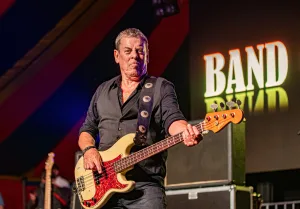 Rory also turned down offers to join Canned Heat and Deep Purple. Why did he choose to continue with his own band?
Rory also turned down offers to join Canned Heat and Deep Purple. Why did he choose to continue with his own band?
I think the Canned Heat thing it’s true. Canned Heat did offer Rory the job, but Rory had his own career, this is way back, when Rory was offered the job by the band Canned Heat after “Blind Owl” (ed: Alan Wilson -died in 1970) passed away. Rory was getting his own band together, Taste had just split up and he wanted to move forward. The Deep Purple thing, Rory would have been great but I don’t think Deep Purple would have been Rory’s bag, really, they are not enough blues.
Do you mean Rory wanted to be his own boss?
I think so, yeah. He wanted to be the captain in his career.
What memories do you have from the Athens concert in 1981?
Oh, that was a hell of a concert (laughs). I remember the riots. I mean, the show was great. We were lucky to spend about 4 or 5 days in Athens before the show because we did a couple of soundchecks, so, it was nice to see Athens and it was very hot because it was in the middle of the summer. The concert was great but it was marred by the riot afterwards. I think the police were a bit heavy-handed with the teargas and everything else. So, it was a hell of a memory (laughs).
Why did you decide to leave the band in 1991?
There were a couple of reasons. As I said before, I’ve always written songs and I had been with Rory for 20 years when I decided to move and I just wanted to try something different. That’s basically what it is all about and the opportunity came up to join Nine Below Zero, a pub blues band from London. So I just decided to move on.
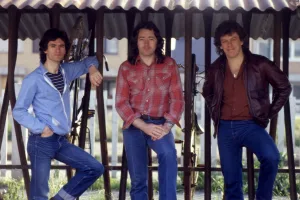 Was it an interesting experience to perform on Midnight Special TV show in 1974?
Was it an interesting experience to perform on Midnight Special TV show in 1974?
Yeah, it was great. It was hosted by Bill Withers (ed: songwriter and performer of “Ain’t No Sunshine” -1971). He said: “I had been in the Navy, I’ve seen many tattoed men, but I never saw a tattoed lady’”, that was his introduction to the “Tatto’d Lady”. It was great. I mean, all the American shows in the ‘70s, Don Kirshner’s Rock Concert had been nice to play, as well. We did quite a lot of them. They were really good.
Would you like to share with us the story when Donal Gallagher (Rory’s brother and manager) sent Bob Dylan away backstage at the Shrine Auditiorium in LA in 1976?
We were sharing dressing rooms, I was in a dressing room with Rory, and Rod and Lou were at a different dressing room. Donal was with the security and he saw this guy coming up with another guy and Donal told the security: “Don’t let this guy in, he’s a Bob Dylan lookalike”. So, the security stopped them and sent them back and Donal realised: “Christ, this is Bob Dylan!”, so, he ran after him and got him and brought him in the dressing room. Bob came in the dressing room, very quickly, he just shook hands with me and Rory and we just started to have a nice talk together about music and a record company guy, I forget his name, decided to bring a bunch of photographers into the dressing room, so, Bob just suddenly disappeared. Terrible shame!
Did you discuss with Bob Dylan?
I just shook hands with Bob and Bob started having a discussion with Rory, because he loved “I Could’ve Had Religion” (ed: from “Live! In Europe” -1972), that song that we did with Rory. Then, they started to talk about blues because they were both interested in the blues when the photographers crashed the party, so to speak and Bob just disappeared, which was a shame.
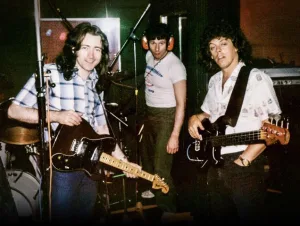 How much has your approach to bass changed over the years?
How much has your approach to bass changed over the years?
I started playing on guitar in the ‘60s in my first band in Belfast and then I picked up the bass because our bass player had to go and there was nobody else to play bass. Of course, I used a pick playing bass and also with Rory I used a pick most of the time. My influences were Paul McCartney, Jack Bruce (Cream), Jaco Pastorius, different players from different types of music. When I joined Nine Below Zero, I got back into the music I love from the ‘60s, the best of all time. I started to listen to James Jamerson, he was a fantastic bass player who played on all of the Motown records and he used one finger, he called it “the hook”. I thought: “I have never had a go at that”, so, I started playing with my fingers, mostly with one finger, just as a different approach and I’ve been doing that ever since.
Is there any younger guitarist who reminds you of Rory?
Well, the guy I said before that we use in the States and sometimes over here, Davy Knowles, reminds me of Rory a lot. Also, Joe Bonamassa, who is a big Rory fan. I mean, I met him a couple of months ago in Dublin and Cork in Ireland, because they will do a show: “Joe Bonamassa Plays Rory Gallagher” in Cork next year (2025), in July and I think I might be doing a couple of Rory songs with Joe Bonamassa, so, that will be interest. Joe was really good, because they had a press conference in Cork for the shows in July, “Joe Bonamassa Plays Rory Gallagher” and Joe played a couple of songs, “Cradle Rock” and “Who’s That Coming” and he was really-really good.
How much impact did The Beatles’ “Rubber Soul” (1965) album have on you?
Oh, it was a turning point for me, before “Revolver” (1966). The Beatles up to that point, before “Rubber Soul”, they were starting to find their way and they were starting to write songs. “Rubber Soul” was really a turning point recording-wise, the songs and there was a different approach and instrumentation that they used on that album, like George Harrison playing a sitar. So, it was an eye-opener for a lot of people and that is an album that changed direction for rock music.
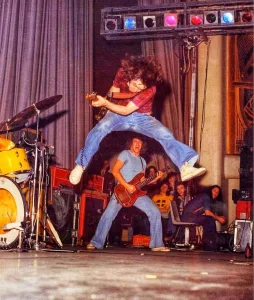 How important is improvisation to you?
How important is improvisation to you?
It’s very important. That’s one thing that Rory was famous for, improvisation. Coming from jazz, the improvisation that there is within jazz. Rory would never play the same thing night after night, he would do different things, so, there was improvisation within the music and that keeps the music alive. I mean, you can go out and play your hit exactly the way that was recorded or you can go out and do something different, which is improvisation and I think that is very important.
I’ve heard that Rory hated his own voice. Is it true?
No, not at all. I think Rory had a unique voice. I would imagine he liked it. I don’t know. I never asked him that question, quite honestly (laughs).
Some artists didn’t like their own voice, like John Lennon and Jimi Hendrix.
Yeah, but that’s common. I mean, I don’t like my own voice.
Me too! I hate my own voice.
Because you are listening to yourself; other people might listen to it and say: “That’s great” and you listen to it and say: “That’s crap. I don’t like it”. It’s just the nature of the instrument, being your voice.
Did you have fun the period you played with Nine Below Zero (1990-2011)?
Yeah! I played for many years with Nine Below Zero after Rory. It was great. Towards the end, I got itchy feel, I wanted to move again, I wanted to do something else. But they were good times.
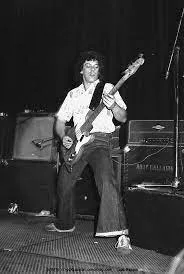 Do you think popular music that was written in the ‘60s and ‘70s is better than today’s music?
Do you think popular music that was written in the ‘60s and ‘70s is better than today’s music?
I don’t know about better, I think it was different and it was original. The music that I do listen to now is mostly older music. My son keeps me up with some newer bands, but as far as house, whatever they call that music, I can’t say that’s hot. At least, it’s not for me.
Are you optimistic about the future of the blues?
It goes in waves. The thing about the blues is that it’s there and then it comes back and it goes and it comes back and it goes. But I must say if you have people like Davy Knowles and Joe Bonamassa keep playing the blues, that’s important; to have these people, the younger generation. I think they keep going and they are great and I can be optimistic about it, yeah.
Please describe to us your lasting collaboration with Simos Pavlidis and Rockin’ the Blues Events?
We’ve been working together with Simos for quite a few years, going way back when we used to play the Kyttaro club and I think now we are playing Gagarin. Simos has always been there and he is a good promoter, he is a good guy, so, we’ll stick with him for another couple of years (laughs).
You ‘ve been on the road with many bands. Who was the nicest guy you’ve met?
Rory. Just Rory (laughs). There were lots of nice guys but the one who stands out in my mind is Rory because he was a really nice man.
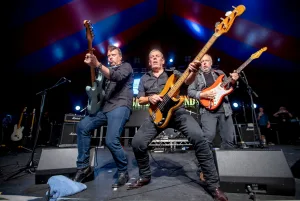 Brian May of Queen is a huge fan of Rory. Did you get to meet him?
Brian May of Queen is a huge fan of Rory. Did you get to meet him?
Yeah! Yeah, a few times. They used to come to some of the shows in America when we played, Brian, John Deacon (bass) and Roger (ed: Taylor -drums) also. Freddie would never come, but the three guys came to a show we did at The Bottom Line in New York, they came to different shows and over the years we met.
Do you think because of the streaming services listening to an album from start to finish is becoming a kind of lost art?
I think the vinyl is making a comeback and has been for quite a few years. Suddenly, you can stream, you can go onto whatever site you wanna go onto and listen to music, but there is something nice about getting a record, 12-inch vinyl record with a cover, opening the cover, seeing the information, putting the record on, just the smell of it, it’s something special. I don’t think that has to go away. A lot of young people, actually, start to listen to vinyl more than anything else.
As a bass player how different is the dynamics in the band between playing with Ted and Brendan?
They are two different drummers. Ted was a heavy drummer, a heavy hitter. He is a rock drummer, you know. Brendan is more of a blues/jazz type of drummer. Brendan is like the king of the shuffle, he does an amazing blues shuffle. Just different drummers and different dynamics. You have to play differently, is just like any drummer, any musician that you play with; sometimes you have to play differently, especially for a bass player with a drummer.
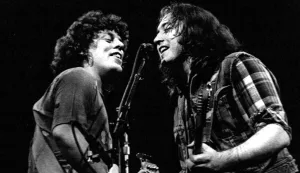 Do you have other influences as a bass player, except Paul McCartney and Jack Bruce?
Do you have other influences as a bass player, except Paul McCartney and Jack Bruce?
There are other guys that I grew up with: As I say, James Jamerson, Bob Babbitt (ed: Motown Records), Jaco Pastorius. I listen to all these guys, even Flea from Red Hot Chili Peppers, he is a great player. But my influences were Paul McCartney, Jack Bruce, even Jet Harris from The Shadows in the ‘60s, that’s when I started listening to bass.
Had you ever met any of those guys?
Jack Bruce! We met Jack Bruce quite a few times. He was great. We did a television show with Rory and Jack Bruce was on this Rockpalast show (ed: on 17 October 1990), but he was just doing a solo thing with a piano and at the end of our show he came up and said: “Can I use your amp?” and he went on and played with Rory, with my amp. I met him the next morning for breakfast and he was great, just talking about the blues, Eric Clapton and Cream.
What was the chemistry you had with Rory like?
Initially, I was learning from Rory, the way he reacted, and after sometime Rory and I had telepathy on stage. Sometimes, I could tell what he was gonna play before he played it and vice versa; he could tell what I was gonna play before I played it. There was a chemistry there between the two of us, even though with different drummers: From Wilgar (ed: Campbell) to Rod, to Ted, to Brendan. There was always a chemistry between myself and Rory.
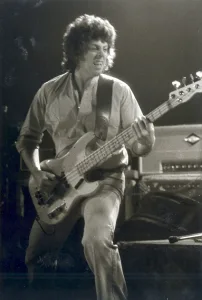 You were booked by Bill Graham to play a Day on the Green concert in 1976 with Jethro Tull, Electric Light Orchestra and Camel at Oakland Coliseum, but it moved to the indoor arena and Camel cancelled. Did you get to know Bill Graham?
You were booked by Bill Graham to play a Day on the Green concert in 1976 with Jethro Tull, Electric Light Orchestra and Camel at Oakland Coliseum, but it moved to the indoor arena and Camel cancelled. Did you get to know Bill Graham?
Yes, they cancelled. We played Winterland and Bill Graham was the promoter (ed: he owned Fillmore East, Fillmore West, Winterland and organised Day on the Green shows). We played Winterland with Blue Oyster Cult, Bob Seger and Rory. Yeah, we met Bill, great man, very tough character.
What was Rory listening to at home or on the road?
Rory listened to everything and anything, he really kept up with music. When we travelled, in the car, we listened to The Doors, Muddy Waters, he even enjoyed the punk thing. Rory was the first one who went and bought an Elvis Costello 8-track tape to play in the car, so, he was always listening to new stuff, as well. Whatever it was current, he would listen to.
A huge “THANK YOU” to Mr. Gerry McAvoy for his time. I should also thank Simos Pavlidis from Rockin’ the Blues Events for his valuable help.
Official Band of Friends website: https://bandoffriends.co.uk/
Official Band of Friends Facebook page: https://www.facebook.com/GMbandoffriends/

